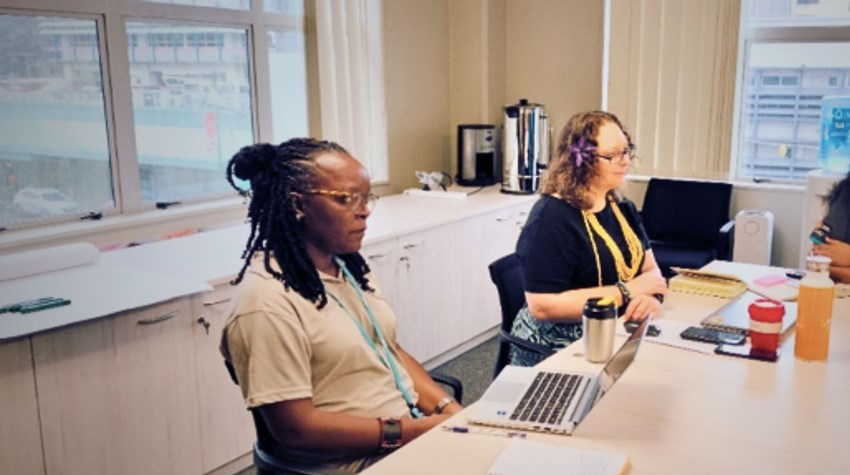Caroline is a passionate advocate for women’s rights and health. With more than 16 years of experience in addressing gender-based violence (GBV) and improving sexual and reproductive health and rights (SRHR), she is working to bring essential health and safety services to women and girls.
Preparedness for better disaster response
Last year, Caroline joined the United Nations Population Fund (UNFPA) team in the Pacific as they delivered support to countries in the region preparing for and responding to crises—like cyclones, earthquakes and flooding.
Her work focused on helping communities in the Pacific region to prepare for and provide essential healthcare and GBV services during emergencies; while working to strengthen existing local systems so they can deliver life-saving support for women and girls. Her work also created and improved safe spaces where women and girls can find protection and support when they need it most.
Understanding the impact of climate change
For Caroline, working in the Pacific has highlighted how climate change increases risks for women and girls. Disasters like cyclones and floods can worsen existing inequalities, leaving women and girls more vulnerable to violence. With climate change increasing the incidence and severity of disasters in the region, it is even more important to increase protection for women and girls, especially during times of increased vulnerability.
“Disasters often make existing challenges worse, and women and girls are affected the most because they often have fewer resources and less power,” Caroline explained.
She emphasises the need to include measures to address GBV in disaster response and planning. This means assessing risks before disasters happen, making sure supplies and resources are ready, and training local organisations to act quickly and effectively when a crisis occurs.
Supporting women and girls with disabilities
Caroline understands that listening to affected communities is the best way to create meaningful change. She works closely with marginalised women and girls to make sure their needs are heard too.
For example, Caroline participated in consultations with women and girls living with disabilities in Fiji. These sessions revealed that the design of dignity kits—packages containing essential hygiene items—were not practical for some people with physical disabilities. Based on feedback, Caroline’s team is now looking for ways to simplify the packaging so that it’s easier for everyone to use.
“Involving women and girls in these discussions ensures that the services we provide are truly helpful and accessible to everyone,” she said.
Tackling challenges, strengthening systems
One of the biggest hurdles Caroline and her team have faced is the varied resources of many Pacific countries to coordinate GBV services during crises. Without strong emergency systems and adequate resources in place, it’s hard to identify who needs help the most, ensuring services are not duplicated and fill gaps in support when an emergency disrupts normal services.
“A well-organised system for responding to GBV in emergencies is essential for meeting people’s needs and ensuring no one is left behind,” said Caroline.
To address this, UNFPA works closely with governments, international agencies and local organisations to build their knowledge and skills. This includes training people working in disaster response to understand GBV risks and incorporating them into their plans and budgets, and providing effective services during a disaster. UNFPA also works with local organisations to help adapt international standards for protecting women and girls in emergencies in a way that is relevant and meaningful for the Pacific.

Caroline (holding microphone) trained the Fiji GBViE sub-cluster on inter-agency minimum standards.
Building sustainable solutions
Caroline’s work is not just about responding to immediate needs—it’s also about creating lasting change. She wants to ensure that addressing GBV becomes a permanent part of national and community plans for development and recovery. This includes supporting local leaders and organisations to identify and address GBV risks in their own communities.
“Empowering local organisations is crucial,” Caroline said. “When communities take the lead in identifying risks and finding solutions, the impact is more sustainable.”
Caroline’s efforts have already had a meaningful impact in the Pacific region. From improving access to support services to ensuring that women and girls with disabilities are included in disaster planning, her work is helping make more people’s lives safer.
Learn more about the work of RedR Australia’s roster members.


